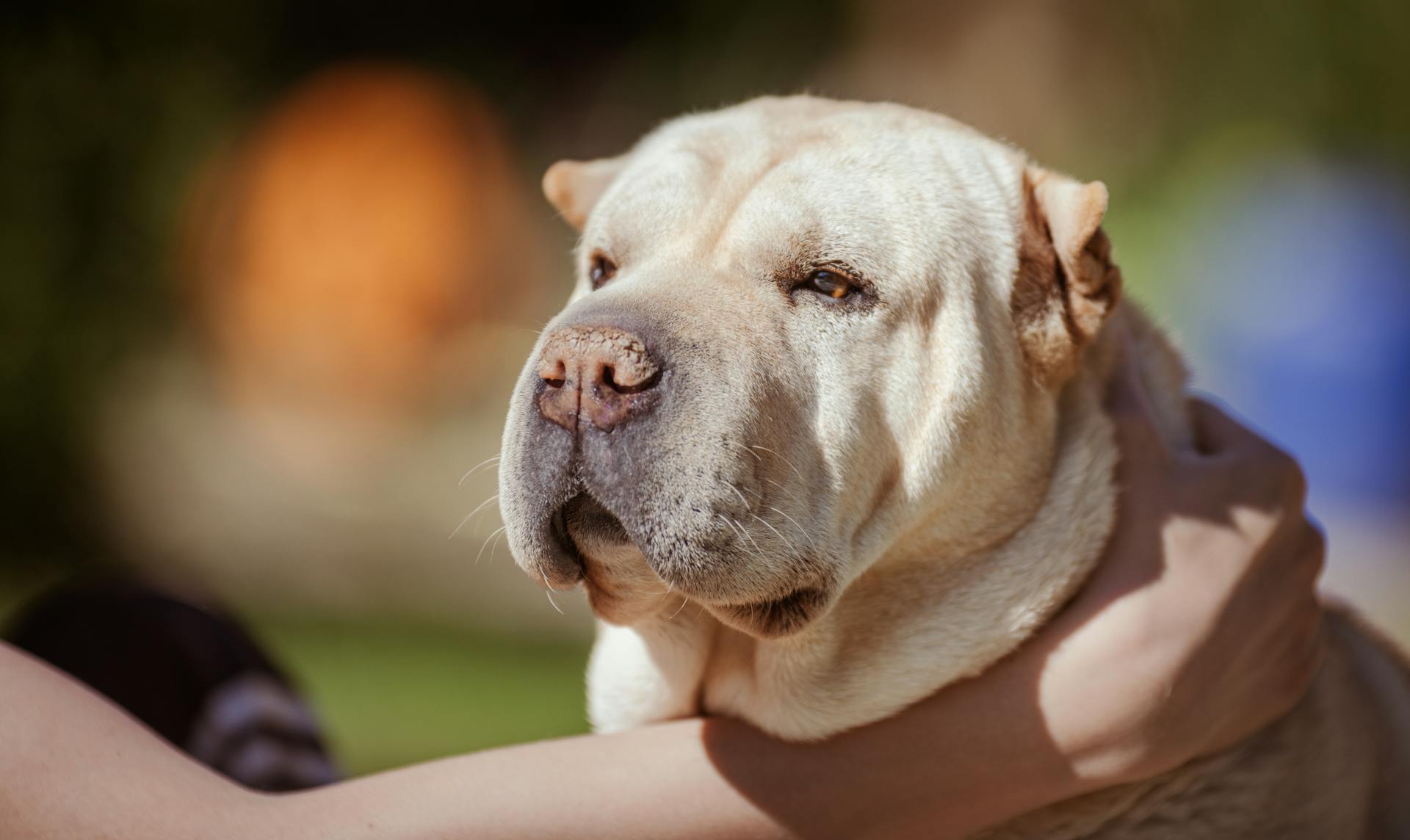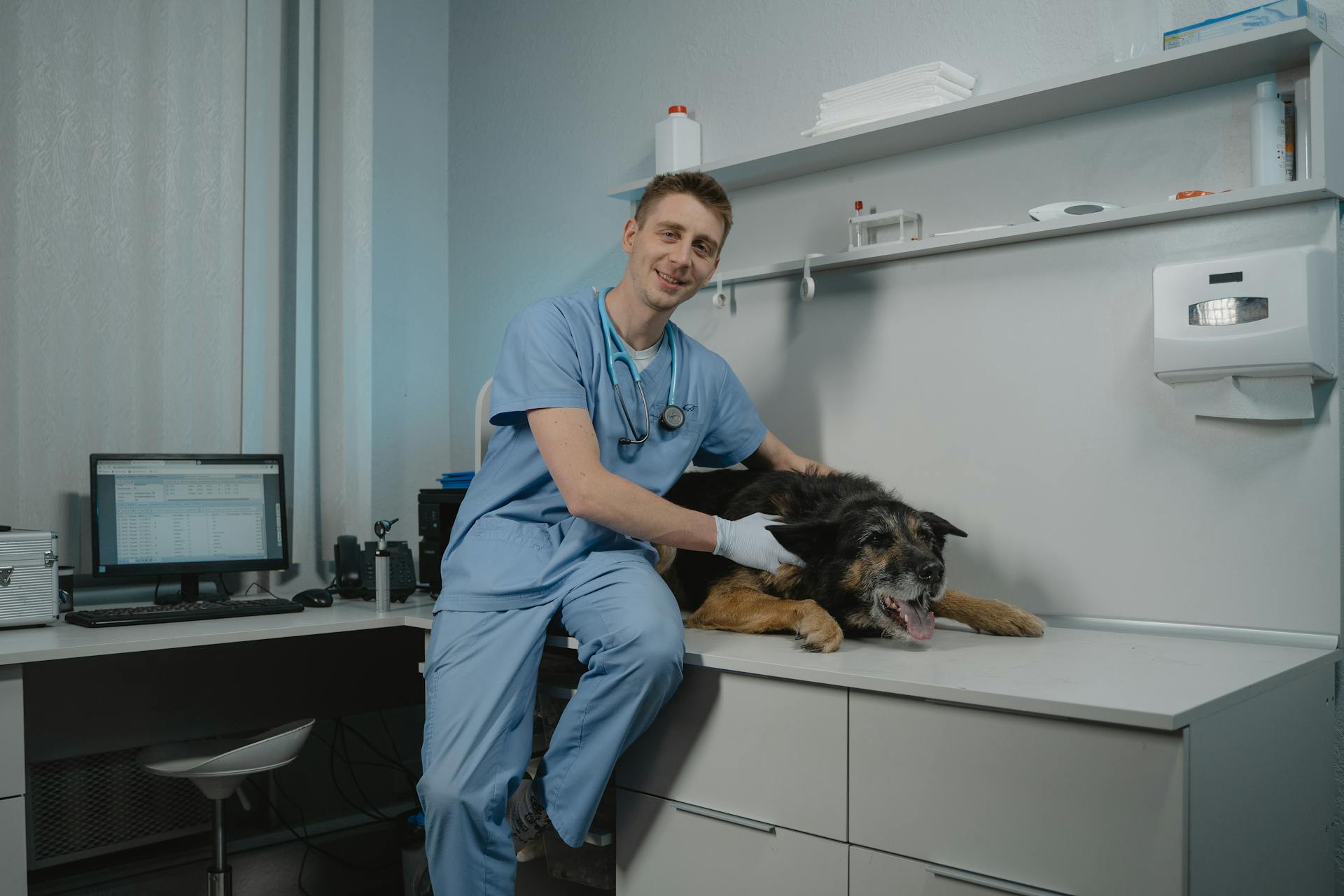
Maltese dogs are prone to certain health issues that can affect their quality of life.
One of the most common health problems in Maltese dogs is hypoglycemia, a condition that occurs when their blood sugar levels drop too low.
Maltese dogs are also susceptible to tracheal collapse, a condition where the trachea or windpipe collapses, leading to breathing difficulties.
This condition is often caused by a narrow trachea, which can be a result of their small size.
Maltese dogs can also be prone to dental issues, such as tooth decay and gum disease, due to their small jaw size and crowded teeth.
Regular dental care is essential to prevent these issues.
Maltese dogs can be prone to eye problems, such as cataracts and progressive retinal atrophy, which can lead to blindness if left untreated.
These health issues can be managed with proper care and attention.
For your interest: Small Dog Diseases
Common Health Issues in Maltese Dogs
Maltese dogs are prone to dental issues, which can lead to tartar and plaque buildup on their teeth. If left unchecked, this can cause tooth decay and bacterial build-up that can enter the bloodstream, causing other infections.

Brushing your Maltese's teeth daily is crucial to prevent periodontal disease. Regular vet visits are also essential to keep their health and well-being in check.
Asthma is a common issue in Maltese dogs, but it can be managed through medications and lifestyle changes. With proper care, dogs with asthma can live a good quality of life.
Maltese dogs are also susceptible to skin problems, including sebaceous adenitis, which causes dry, scaly skin with patches of hair loss. Early detection and treatment are key to managing this condition.
Malassezia dermatitis is another skin infection that can affect Maltese dogs, causing itching, redness, and brown waxy discharge in the ears, and greasy, hairless areas on the skin. Underlying allergies can exacerbate this condition.
Some Maltese dogs may experience breathing issues due to conditions like Collapsed Trachea, which can cause major breathing problems. Mild cases may be managed through medications, while more severe cases may require surgery.
Here are some key health issues to watch out for in Maltese dogs:
- Multiple skeletal issues, including hip dysplasia and Luxating Patella
- Bladder stones, which can damage kidneys if not caught in time
- Asthma, which can be managed through medications and lifestyle changes
- Collapsed Trachea, which can cause major breathing problems
Dental Disease
Dental disease is a common chronic problem in pets, affecting 80% of all dogs by age two.
Your Maltese is more likely than other dogs to have problems with her teeth, starting with tartar build-up on the teeth and progressing to infection of the gums and roots of the teeth.
If left untreated, dental disease can lead to tooth loss, and even damage to your dog's kidneys, liver, heart, and joints.
In severe cases, dental disease can cut your dog's life span short by one to three years.
Regular dental cleanings with your veterinarian are crucial to prevent and treat dental disease.
You can also help keep your dog's teeth clean at home, but it's essential to consult with your veterinarian for guidance on the best methods and products to use.
By working together, you can help prevent dental disease and keep your Maltese's teeth and gums healthy for years to come.
Readers also liked: Dogs Gums Bleeding When Chewing Toy
Breathing Issues
Maltese dogs can be prone to breathing issues, with asthma being the top concern in this breed. Asthma is usually triggered by environmental allergens and is more common in smaller dogs than larger dogs.
A collapsed trachea is another common condition that can cause breathing trouble in Maltese dogs. This condition is often caused by a genetic weakness of the cartilage surrounding the windpipe.
Symptoms of a collapsed trachea include coughing or wheezing and a decreased desire for play and exercise. This condition can be very painful and hard to treat.
If your Maltese is experiencing breathing issues, it's essential to contact your veterinarian immediately. Proper medication and lifestyle changes can help manage asthma and other breathing issues in Maltese dogs.
Curious to learn more? Check out: Bull Terrier Skin Issues
Skin and Coat Issues
Maltese are prone to a variety of skin problems, including sebaceous adenitis, which causes dry, scaly skin with patches of hair loss.
You may first notice this issue when your dog is between one and five years old, typically on the top of their head, back of the neck, and back.
Treatment is generally long term and may involve a combination of approaches to determine what works best for your dog.
Fatty acid supplements and special shampoos are almost always needed to remove dead skin and hair.
The response to treatment is highly variable, but the earlier you catch the issue, the better your dog's results will be.
Maltese are also susceptible to skin infections and diseases caused by yeast, such as Malassezia dermatitis.
This infection can cause itching, redness, and brown waxy discharge in the ears, and greasy, hairless areas on the skin, especially on the neck and throat.
A characteristic odor often accompanies this infection, and underlying causes like allergies can increase your dog's itchiness and discomfort.
The earlier you have your dog's skin problems checked out, the less likely you are to end up with an itchy, bald, smelly dog.
For more insights, see: American Bully Ear Infection
Eye and Ear Issues
Eye and ear issues are common in Maltese dogs.
Deafness is a significant concern in Maltese dogs, with some breeds having a higher incidence of deafness than others.
Maltese dogs are prone to ear infections due to their small ear canals and long, hanging ears.
Intriguing read: What Breeds of Dogs Are Prone to Deafness
Proper ear care is essential for preventing ear infections in Maltese dogs, including regular cleaning and checking for signs of infection.
Some Maltese dogs may be born with eye problems such as microphthalmia, a condition where the eyes are smaller than normal.
Maltese dogs are also prone to progressive retinal atrophy, a degenerative eye disorder that can lead to blindness.
Digestive Disorders
Maltese dogs can be prone to digestive disorders, including conditions that cause ongoing vomiting, diarrhea, or weight loss. These inherited conditions can start early in life.
Some common digestive disorders in Maltese dogs include diseases of the pancreas and intestines, as well as food sensitivities or allergies. These problems can be prevented or managed with a high-quality pet food recommended by your veterinarian.
Inflammatory Bowel Disease, or IBD, is an immune system disorder that can cause the intestinal lining to become inflamed. This can lead to chronic vomiting or diarrhea, and may flare up suddenly before improving again.
A unique perspective: Does Kennel Cough Cause Vomiting

Symptoms of IBD in Maltese dogs may not be immediately apparent, but can include digestive upsets that don't have a clear cause. If you notice these symptoms in your dog, diagnostic tests may be needed to confirm the diagnosis.
Colitis is another condition that can cause the colon to become swollen and inflamed. Symptoms of colitis in Maltese dogs may include diarrhea and blood in the feces.
Thyroid and Other Issues
Maltese dogs are prone to hypothyroidism, a condition where the body doesn't make enough thyroid hormone.
This can lead to dry skin and coat, hair loss, and susceptibility to other skin diseases.
Weight gain is also a common symptom, as well as fearfulness and aggression in some cases.
We'll conduct an annual blood screening test to screen for the disease.
Treatment for hypothyroidism is usually simple and involves replacement hormones given in the form of a pill.
A fresh viewpoint: Hypothyroidism in Dogs Skin Problems
Parasites and Infections
Maltese are susceptible to bacterial and viral infections such as parvo, rabies, and distemper, which are preventable through vaccination.
Many of these infections are preventable with proper vaccination, which we recommend based on the diseases in our area, your Maltese's age, and other factors.
Fleas, ticks, and ear mites can infest your Maltese's skin and ears, causing excessive itching and scratching.
Hookworms, roundworms, heartworms, and whipworms can get into your Maltese's system through contaminated water, soil, or being bitten by an infected mosquito.
These parasites can cause pain, discomfort, and even death in your Maltese, and some can be transmitted to you or a family member, making regular testing and prevention essential.
Preventive medication can help keep your Maltese healthy, and it's crucial to treat the dog's surroundings to prevent reinfestation after initial treatment.
Parasites
Parasites can invade your Maltese's body, inside and out, causing pain, discomfort, and even death. Fleas and ticks can infest her skin, while ear mites can infest her ears.
Hookworms, roundworms, heartworms, and whipworms can get into her system by drinking unclean water, walking on contaminated soil, or being bitten by an infected mosquito. These parasites can be transmitted to you or a family member.
Explore further: Skin Parasites in Dogs
Fleas and mange are parasites that live on the skin of the dog, causing excessive itching and scratching, and in extreme cases, a loss of hair. Fleas can also attack people.
It's essential to test for parasites on a regular basis to keep your canine friend healthy. We'll also recommend preventive medication as necessary.
Infections
Maltese are susceptible to bacterial and viral infections, just like any other dog.
These infections can be prevented through vaccination, which is recommended based on the diseases in your area, your dog's age, and other factors.
Parvo, rabies, and distemper are just a few examples of the infections that can affect Maltese.
Many of these infections are preventable with proper vaccination, which is a crucial part of keeping your Maltese healthy.
For your interest: Lyme Vaccination for Dogs Side Effects
Allergies and Sensitivities
The Maltese dog may be sensitive to his surroundings or foods, which can cause an allergic or sensitivity reaction that manifests in dry skin and irritation on the paws or ears of the dog.
This condition is often noticed when the dog begins to excessively lick or chew his paws or scratch at his ears.
Changing the food or removing the allergen from the dog's surroundings can treat this condition.
Providing the dog with an antibiotic to prevent infection is a good idea, especially if the skin is already irritated.
Luxating Patella and Joint Issues
Many small breeds of dog suffer from a condition known as Luxating Patella, which refers to problems with the knee joint being stable.
Maltese are particularly prone to this condition, and it can cause their joints to pop out of alignment.
Some dogs can live with this condition without much pain, but they may shy away from being too active.
In severe cases, vets typically recommend surgery to correct the condition.
Dogs with Luxating Patella may experience quite a bit of pain, which can be distressing for both the dog and its owner.
Home Care
Home care is crucial for maintaining your Maltese's health and happiness. Supervise your pet as you would a toddler, keeping doors closed, picking up after yourself, and blocking off rooms as necessary to keep her out of trouble and away from objects she shouldn’t put in her mouth.
Daily brushing and regular grooming is needed every 6-8 weeks to keep her coat beautiful, so make sure to schedule it into your routine. Clean her ears weekly, even as a puppy, to prevent any potential issues.
Maltese often have serious problems with their teeth, so brush them at least three times a week to keep them healthy. Don't forget to brush her teeth regularly, it's a small task that can make a big difference in her oral health.
To keep your Maltese physically active, give her daily walks and short play sessions, especially since she is well suited to apartment life. Avoid prolonged exposure to the sun due to her all-white coat, which can lead to sunburn.
Here are some specific home care tasks to remember:
- Brush her teeth at least three times a week.
- Clean her ears weekly.
- Give her daily walks and short play sessions.
- Avoid prolonged exposure to the sun.
Final Thoughts and Considerations
As you've learned about the various Maltese dog diseases, it's essential to remember that regular veterinary check-ups can help prevent or catch these issues early on.
Maltese dogs are prone to hypoglycemia, which can be life-threatening if not addressed promptly.
Keep your Maltese's weight under control to reduce the risk of obesity-related health problems.
A balanced diet and regular exercise are crucial for maintaining your Maltese's overall health, but also be mindful of potential allergies and sensitivities.
Final Thoughts
As you've learned, the Maltese breed is generally healthy, but it's essential to be aware of the potential health conditions they may face.
Proper exercise is crucial for your Maltese's overall health, so make sure to provide regular physical activity.
A healthy and balanced diet is also vital, as it will help prevent certain health issues from arising.
Regular routine check-ups with a veterinarian are necessary to catch any potential problems early on.
By taking these precautions, you can help ensure your Maltese stays healthy and happy.
A fresh viewpoint: Skin Care for Dogs with Allergies
Key Considerations

As you consider bringing a Maltese into your family, there are some key considerations to keep in mind. The breed is prone to multiple skeletal issues, including hip dysplasia and Luxating Patella.
Maltese dogs are small, and their tiny bladders can lead to bladder stones, which can cause serious kidney damage if not treated promptly.
Asthma is another common issue in Maltese dogs, but it can be managed with medication and lifestyle changes.
Collapsed Trachea is a serious condition that can cause breathing problems, and in severe cases, surgery may be necessary.
Here are some common health issues to watch out for in Maltese dogs:
- Change in appetite or water consumption
- Tartar build-up, bad breath, red gums, or broken teeth
- Itchy skin (scratching, chewing, or licking), hair loss
- Lethargy, mental dullness, or excessive sleeping
- Fearfulness, aggression, or other behavioral changes
Frequently Asked Questions
What is the leading cause of death in Maltese?
For Maltese dogs, heart failure is a leading cause of death, especially in their golden years. Understanding the risks and symptoms can help prevent this condition.
What are the drawbacks of a Maltese?
Maltese owners should be aware of potential health issues, including hypoglycemia, collapsed trachea, and progressive retinal atrophy, which may require regular veterinary check-ups and monitoring. Additionally, some Maltese may be prone to conditions like portosystemic liver shunt, reverse sneezing, and white dog shaker syndrome.
What is the average life expectancy of a Maltese?
The average life expectancy of a Maltese is 12-15 years. With proper care, many Maltese can live well into their teens.
Sources
- https://www.dogster.com/dog-health-care/common-health-problems-in-maltese-dogs
- https://www.petinsurancereview.com/blog/common-maltese-dog-health-issues
- https://www.cuteness.com/article/skin-disorders-maltese-dogs
- https://eastcooperanimalhospital.com/client-resources/breed-info/maltese/
- https://glasgowvetclinic.com/client-resources/breed-info/maltese/
Featured Images: pexels.com


